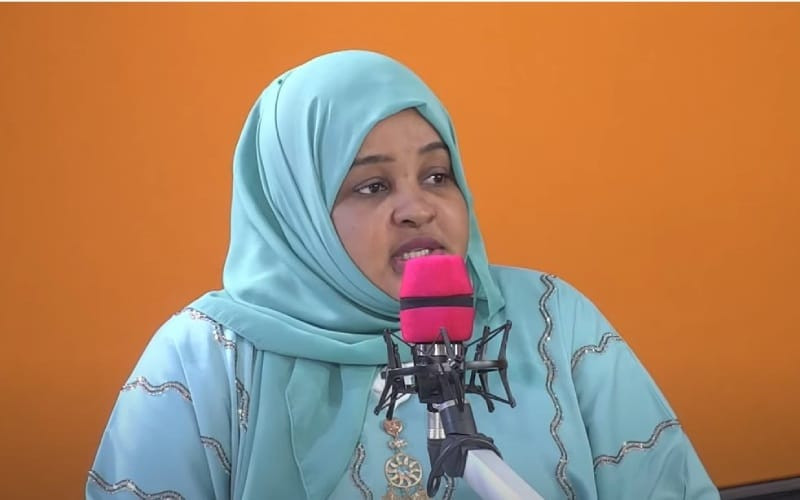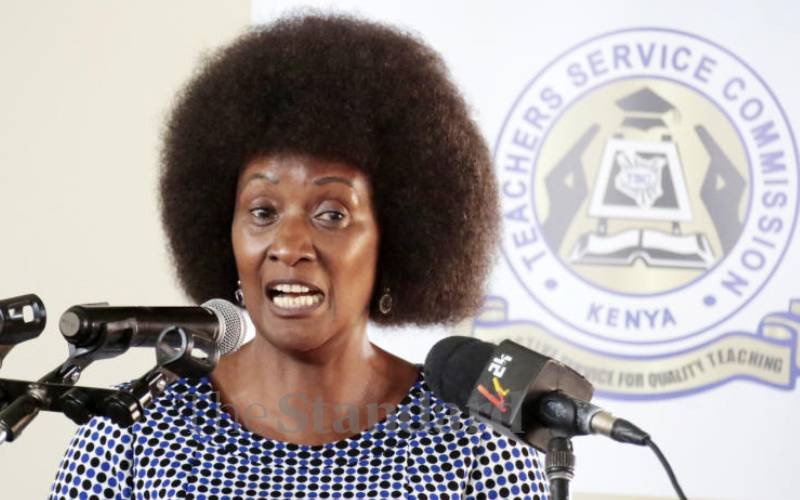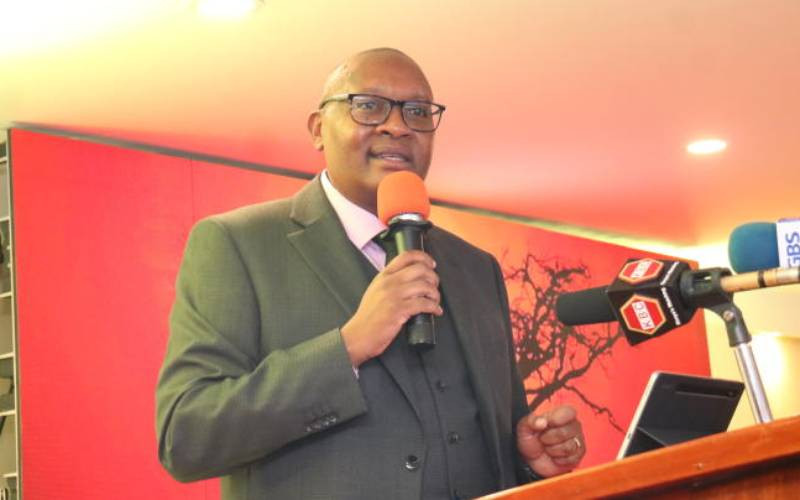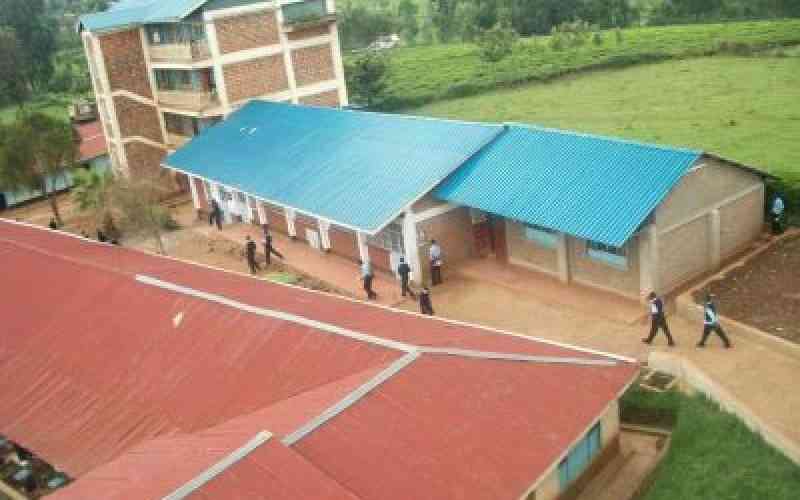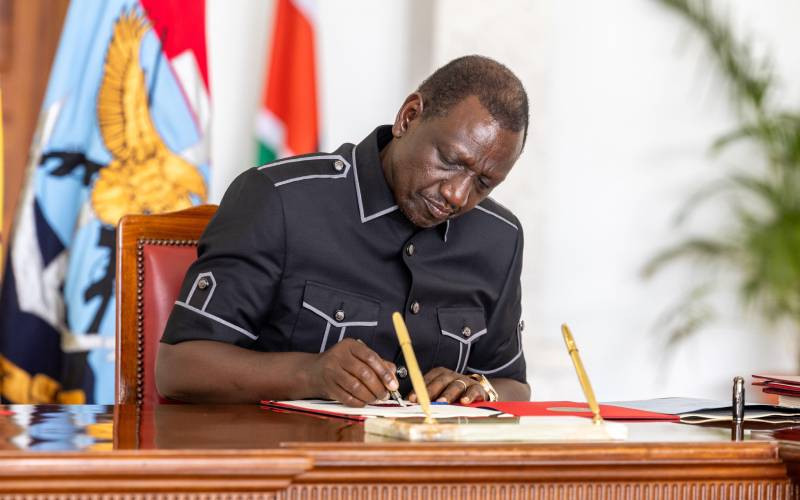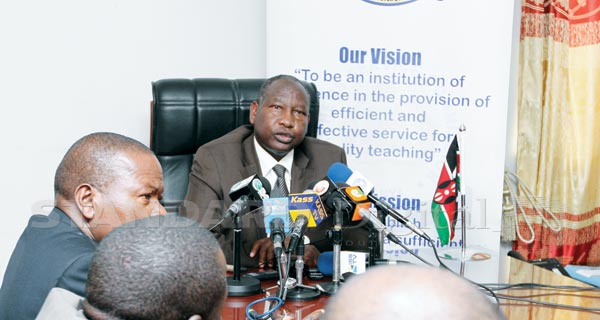 |
|
TSC Secretary Gabriel Lengoiboni when he appeared before the Senate’s Committee on Education [Photo: File/Standard] |
By Alphonce Shiundu
Nairobi, Kenya: The Teachers Service Commission (TSC) has warned all graduates seeking employment as teachers that the commission will not employ them, unless they had a minimum C+ grade in their Form Four examination.
Speaking when he appeared before the Senate’s Committee on Education, TSC Secretary Gabriel Lengoiboni told Senators that the practice where untrained teachers go back to school to get a degree and then a Masters, without having the minimum qualifications to join university had to be stopped.
“The Government has set a minimum grade for one to join university. It is a C+. If you want to teach in a high school, you should have a C+. If you don’t, we will not employ you. You should go back and do your KCSE,” said Mr Lengoiboni yesterday.
The warning to the unemployed graduates targets mainly primary school teachers (P1), who had hoped that with their university degrees, they might be employed as secondary school teachers.
TSC is currently recruiting 4,878 high school teachers and 5,122 for primary schools.
P1 teachers without a C+ and above in their KCSE will thus continue to teach in primary schools but on a higher grade.
Chairman of the committee Mutahi Kagwe (Nyeri) led Senators Halima Mohamud (nominated), Kennedy Mong’are (Nyamira), Boy Juma Boy (Kwale) and Daisy Nyongesa (nominated) in questioning if TSC had communicated the policy to all the graduates.
Warnings
Senators were shocked when Mr Lengoiboni told them that he had sent circulars and also published advertisements in the newspapers warning the graduates.
The TSC boss said it was the work of the Commission for University Education to make sure that all those joining university meet minimum qualifications set by the Government. If implemented, the policy will affect thousands of P1 teachers, who had joined universities to boost their chances of being picked as graduate teachers, for high schools.
Mr Lengoiboni told Senators that the TSC had discussed with private and public universities about the need to ensure that only those who meet minimum grade were admitted.
Similarly, TSC boss said marriage was responsible for unequal distribution of teachers, because many of them seek transfers to be with their husbands as soon as they get married.
“Most of these ladies get married as soon as they get a job. We cannot be transferring female teachers every time they get married. It has been a big challenge to staffing. But we’ve been advising them that even as they get married, they should make arrangements of how they will see their husbands,” Lengoiboni said.
Hardship allowance
Stay informed. Subscribe to our newsletter
TSC told senators it was working on a review of distribution of teachers in counties, so that the ratio of teacher-to-student is rationalised. However, Lengoiboni added it will be upon Parliament to provide money to employ more teachers for quality education.
The Senators said the criteria forbuilding new schools was haphazard, to the extent that “any elected leader can wake up and decide to start a school in any area”.
Designation of hardship areas and the consequent allowances for the areas was also questioned.
“There are schools, which are in the same town, but one teacher gets a hardship allowance, while the other does not, simply because, there’s a road or a stream that places one of them in a district that has been designated as a hardship area” said Lengoiboni.
“50 years after independence, these regions are still categorised as hardship areas. There’s need to develop the areas so that we retain people that we post there. We should build houses, provide water, electricity and even solar panels,” said the TSC boss.
 The Standard Group Plc is a
multi-media organization with investments in media platforms spanning newspaper
print operations, television, radio broadcasting, digital and online services. The
Standard Group is recognized as a leading multi-media house in Kenya with a key
influence in matters of national and international interest.
The Standard Group Plc is a
multi-media organization with investments in media platforms spanning newspaper
print operations, television, radio broadcasting, digital and online services. The
Standard Group is recognized as a leading multi-media house in Kenya with a key
influence in matters of national and international interest.
 The Standard Group Plc is a
multi-media organization with investments in media platforms spanning newspaper
print operations, television, radio broadcasting, digital and online services. The
Standard Group is recognized as a leading multi-media house in Kenya with a key
influence in matters of national and international interest.
The Standard Group Plc is a
multi-media organization with investments in media platforms spanning newspaper
print operations, television, radio broadcasting, digital and online services. The
Standard Group is recognized as a leading multi-media house in Kenya with a key
influence in matters of national and international interest.


